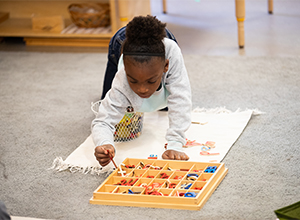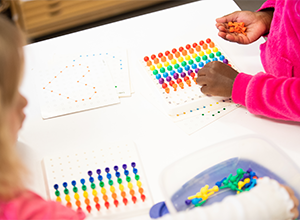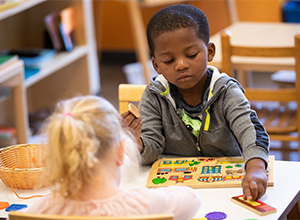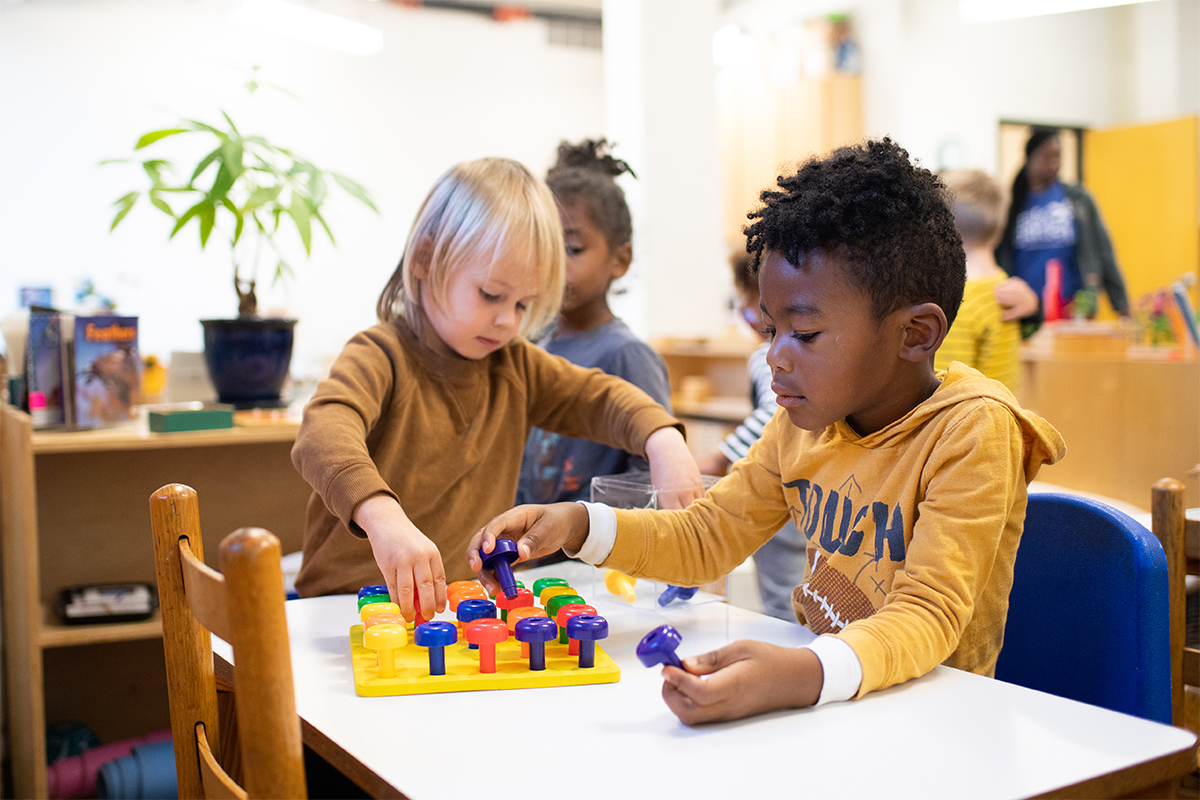Last spring, City Garden Montessori School nearly eliminated the kindergarten readiness gap among racial and economic groups in its preschool classrooms.
Eighty-four percent of Black preschoolers and 86% of white preschoolers finished the year with the academic, social, and physical skills needed to successfully transition to kindergarten, according to data collected from the school’s PreKindergarten Observation Form (PKOF), a normed school readiness tool.

A child forms words with a moveable alphabet.
Research shows that kindergarten readiness can predict achievement throughout elementary school and beyond. It is particularly critical for low-income children of color, who often begin kindergarten behind their classmates. A child’s readiness depends on where they are in physical, social-emotional, and academic domains.
“Children living in poverty tend to start school one or two years behind because they don’t have these extra educational experiences children in more privileged environments get through exposure,” said Mike Flohr, Interim Director of Curriculum and Instruction. When children begin kindergarten ready to learn, he added, “We don’t lose another year.”
After a year filled with challenges, teachers and staff at City Garden recognized the pre-kindergarten data as something to celebrate.
Expansion improved access
City Garden – a public charter school in the Botanical Heights neighborhood – has more than doubled its number of preschool seats since 2019, due to a $16.5 million expansion that received financial support from many donors – including The Opportunity Trust. City Garden gives preschool enrollment preference to children who qualify for a free or reduced-price lunch, ensuring it reaches the most economically disadvantaged families. This year, 120 children are enrolled.
“Growing our pre-K program has not been easy, but I believe it is one of the most impactful things we are doing,” said Christie Huck, executive director of the school.
Inside a preschool classroom in October, students went about their individual tasks that are hallmarks of Montessori education: sorting strings of counting beads, tracing sandpaper letters with their fingers, matching images to words, and placing individual dried beans into a bowl.

Children complete a pattern using visual discrimination skills and fine motor skills.
Each task has a purpose. The century-old Montessori model focuses on small lessons and hands-on activities – all of them student-directed.
“For children it doesn’t feel structured, but it’s highly structured,” Flohr said. “Within each domain there’s a learning continuum and a pathway forward.”
Aaron Jackson, a City Garden parent, has a daughter in preschool this year.
“It’s been phenomenal,” he said of the experience. “When I watch her outside of school, at home or at the playground, she’s much more confident in trying things herself, and in doing things by herself. It’s also very clear she’s developing academically.”
Laying the foundation

Puzzles are part of the Montessori curriculum.
Preschool is the seed that City Garden grew from. The school took root in the 1990s as a private, tuition-based preschool inside an old tavern on South Newstead, primarily serving nearby families. The school grew to include elementary grades. High parent demand led school organizers to petition the state to convert to a public charter school, eventually becoming a K-8 school in Botanical Heights.
This fall, 120 preschoolers and 84 kindergarteners are enrolled, up from 52 preschoolers and 30 kindergarteners prior to expansion.
City Garden is a partner in the STL Pre-K Cooperative, which allowed the school to enhance its kindergarten readiness assessments using PKOF and join a network of early childhood providers that are committed to improving equitable access to pre-K in St. Louis.
“Our Early Childhood Education Center is the foundation of our entire program,” Huck said.
Expansion has allowed City Garden to invest in teacher training and support with a focus on equity.
It also resulted in the hiring of an early childhood special education instructor. They have also contracted with a speech and language team that provides therapeutic services and speech and language screening for preschool and kindergarten students.
“Looking at the outcomes from last year, that all shows up there,” Huck said. “With growth we were able to put additional resources and structures in place that had a tremendous impact.”
